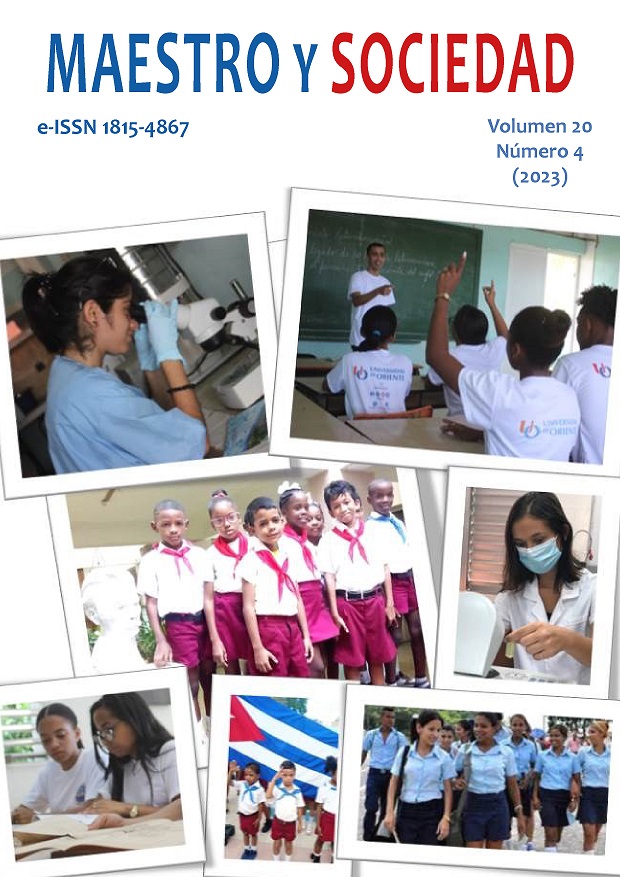Implementación de un ambiente experimental para potenciar el aprendizaje significativo en Ciencias Naturales en escolares de Educación Básica
Palabras clave:
Aprendizaje significativo, ciencias naturales, educación básica, participación estudiantil, desarrollo de habilidadesResumen
Este artículo explora la implementación del "Rincón Experimental" en un aula de cuarto año de educación básica, destacando su efectividad en mejorar el aprendizaje significativo en Ciencias Naturales. A través de un enfoque cualicuantativo, se analiza cómo este espacio interactivo y práctico enriquece la experiencia de aprendizaje, fomenta la curiosidad y el entusiasmo por la ciencia, y desarrolla habilidades clave como la colaboración, la comunicación y la autonomía en el aprendizaje. El estudio muestra un aumento significativo en la comprensión conceptual, la confianza de los estudiantes y su capacidad para aplicar conocimientos en contextos del mundo real. Estos hallazgos subrayan la importancia de integrar métodos experimentales y prácticos en la enseñanza de las ciencias.
Citas
Abraham R.M (2011)¿Qué se puede aprender de las Actividades de Laboratorio? Journal of Chemical Education, 88(8), 1020-1025, 2011.
Arrieta Illarramendi, E., & Maiz Olazabalaga, I. (2000). Interacción social y contextos educativos. Revista de Psicodidáctica, (9). https://www.redalyc.org/articulo.oa?id=17500905
Ausubel, D. P. (1963). The Psychology of Meaningful Verbal Learning. Grune & Stratton.
Ausubel, D. P. (1968). Educational Psychology: A Cognitive View. Holt, Rinehart and Winston.
Baque R. G.R., & Portilla F. G.I (2021) Pol. Con., 6(5), 75-86.
Barberá, O. y Valdés, P. (1996). “El trabajo práctico en la enseñanza de las ciencias: una revisión”. Enseñanza de las Ciencias, 14(3), 365-379.
Bruner, J. (1990). La educación, puerta de la cultura. Editorial Visor.
Burke, B. Hand, J. Poock, T. Greenbowe. (2003). Uso de la Heurística de Escritura Científica en la Formación de Asistentes de Enseñanza de Química
Greenbowe, D. Meltzer. (2003). A Aprendizaje estudiantil de conceptos termoquímicos en el contexto de la calorimetría de soluciones. Int. J. of Sci., 25 pp. 779-800
Hidalgo B. A. V. (2023) La autonomía en el aprendizaje y su relación con el rendimiento académico en contextos rurales. https://ridum.umanizales.edu.co/xmlui/bitstream/handle/20.500.12746/5619/%28Hidalgo_Astrid_Viviana_2020.pdf%29.pdf?sequence=1&isAllowed=y
Hmelo-Silver, C. E. (2004). Problem-based learning: What and how do students learn? Educational psychology review, 16(3), 235-266.
Hofstein, A. (2004). El laboratorio en la educación química: treinta años de experiencia en desarrollos, implementación e investigación. Chem. Educ. Res. Pract. 5, 247-264,
Martínez Torregrosa, et al. (2012). La integración de los trabajos prácticos en la enseñanza de la química como investigación dirigida. Educ. quím., 23(núm. extraord. 1), 112-126.
Novak, J. D., & Gowin, D. B. (1988). Learning How to Learn. Cambridge University Press.
Simpson, H. D. (2002). The Classification of Educational Goals, Handbook I: Cognitive Domain. Bloom's Taxonomy. Longman.
Soria Aznar et al. (2023). El mapa conceptual: una nueva herramienta de trabajo. Diseño de una práctica para Fisiología. https://www.unizar.es/eees/innovacion06/comunic_publi/bloque_iv/cap_IV_5.pdf
Vargas Castillo, C. A., Herández Martínez, C. E., & Guilén Hernández, P. I. (2023). La interacción social como elemento del proceso educativo en educación media superior. Transdigital, 4(8), 1–10. https://doi.org/10.56162/transdigital271
Vázquez A. y Cebrián D.(2021) Enseñanza y aprendizaje de las ciencias basados en la indagación (IBSE): aspectos clave.
Descargas
Publicado
Cómo citar
Número
Sección
Licencia
Derechos de autor 2023 Karen Ginabell Mieles Mero, Herman Arnulfo Cevallos Sánchez

Esta obra está bajo una licencia internacional Creative Commons Atribución-NoComercial-SinDerivadas 4.0.
Esta revista proporciona un acceso abierto inmediato a su contenido, basado en el principio de que ofrecer al público un acceso libre a las investigaciones ayuda a un mayor intercambio global de conocimiento. Cada autor es responsable del contenido de cada uno de sus artículos. Los artículos pueden ser inéditos o estar disponibles previamente en servidores de preprints reconocidos por la revista. Sin embargo, no se permite la duplicación de la publicación o traducción de un artículo ya publicado en otra revista o como capítulo de un libro.
This journal provides immediate open access to its content, based on the principle that providing the public with free access to research supports a greater global exchange of knowledge. Each author is responsible for the content of each of their articles. Articles may be previously unpublished or available on preprint servers recognized by the journal. However, duplication of publication or translation of an article already published in another journal or as a book chapter is not permitted.
Esta revista oferece acesso aberto imediato ao seu conteúdo, com base no princípio de que oferecer ao público acesso gratuito à pesquisa contribui para um maior intercâmbio global de conhecimento. Cada autor é responsável pelo conteúdo de cada um de seus artigos. Os artigos poderão ser inéditos ou estar previamente disponíveis em servidores de preprints reconhecidos pela revista. No entanto, não é permitida a duplicação de publicação ou tradução de artigo já publicado em outro periódico ou como capítulo de livro.



























 Universidad de Oriente
Universidad de Oriente 